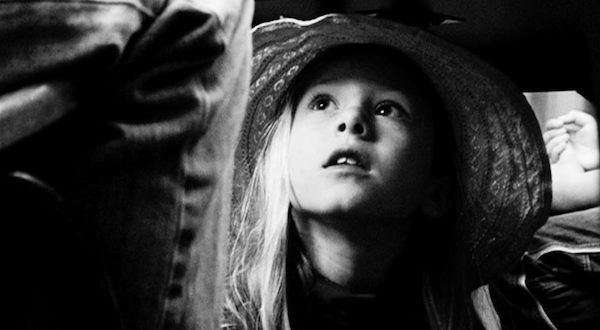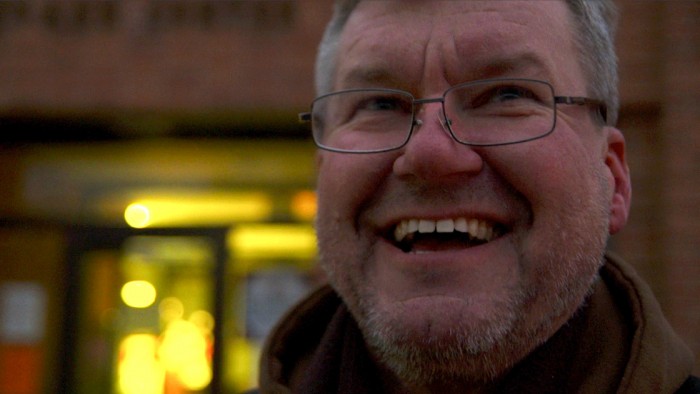Out of all I’ve seen at this past Wisconsin Film Festival, the films that have left the strongest impression have been documentaries. From Rich Hill’s lush social tapestries to the packaged visual brilliance of Sharan Mohanadoss’ “Strings of Color,” it’s been an exceptionally strong fest for documentary filmmaking. Even Wisconsin Rising, whose close focus unfortunately lent itself to telling the story of Act 10 via tunnel vision, seems to have garnered plenty of attention from filmgoers in part, I would argue, because of its inherent idealism. There’s a definite bent to Sam Mayfield’s chronicle of state injustices that appeals to a subsection of Madison — and likely repels another smaller one of differing disposition.
Such idealism, occasionally to the point of naïveté, is also on display in Approaching the Elephant. Amanda Rose Wilder uses a bare-bones documentary style devoid of talking heads and title cards (short of a brief historical note on experimental education) to explore one man’s attempts to establish an experimental “free” school in New Jersey. Like many experimental schools, the Teddy McArdle Free School (named after the wunderkind main character in J.D. Salinger’s “Teddy”) allows students to determine their own disciplinary rules and curriculum through democratic processes. As experiential in its approach as it is experimental, Teddy McArdle’s students are shown learning lessons through unconventional means — by way of a bird they’ve spotted outside or in pounding away at wood in the school’s workshop.
It’s difficult to say whether the freedom to construct bike ramps in the school parking lot is of any real value to Teddy McArdle’s students but Wilder, who expressed an interest in experimental education after the screening, checks her biases at the door, letting her camera linger in exploring the student-student and student-teacher interactions through pure observation. Those latter interactions include teacher and Teddy McArdle founder Alex Khost. In adhering to his school’s “hands off” democratic approach, Khost doesn’t see himself as a principal, presenting himself less an authority and more an older pupil to his students. When discipline is required, staff and students gather in a room for “council meetings” where students vote on the proper course of action. Several council meetings are held specifically to address the ambivalent and destructive behavior of Jiovanni, Teddy McArdle’s mop-headed bad boy. Despite his visible frustration with Jiovanni, Khost never vetoes decisions reached by the students no matter how equivocating or misguided they seem. By the end of Approaching the Elephant, Khost can only offer an ultimatum, delivered to his students with a frankness typically reserved for adults, in which he offers a choice between his continued presence in the school and Jiovanni’s.
Khost’s ultimatum is par for the course in his adherence to his own cause. He clearly dislikes the increasingly meddlesome Jiovanni but would rather his students decide his fate through the structure of his free school than exert a disciplinarian presence. It’s an extension of Khost’s steadfast dedication to his principles, an extreme version of his students walking out on a presentation on the art of Vermeer. Behind the scenes, Wilder shows cracks in Khost’s armor as he wonders aloud to fellow staff whether his system is working. This moment of doubt shows Teddy McArdle’s founder poking his head above the din of his own idealism, but his doing so out of students’ earshot only shows a dedication to providing as pure a system as he can — even one removed from his own doubts and interference.

Jesse Moss’s The Overnighters has its own idealist at its center. In documenting America’s economic hardships, Moss looks to the city of Williston, North Dakota and its promises of prosperity after the Parshall Oil Field’s discovery in 2006. With barren landscapes punctuated by triumphant towers and platforms, some shots look like modernized versions from There Will Be Blood. Certainly Paul Thomas Anderson’s “problematized American dream” resurfaces in the disconnect between North Dakota’s promises and Williston’s inability to house the rapid influx of labor.
A ray of hope, however, persists in Pastor Jay Reinke and his “Overnighters” program, which provides work-hungry migrants from out of state with beds to stay in — or at a minimum, enough floor space for a cot. Like Wilder, Moss appears interested in one subject on the surface while finding a more interesting one underneath. In The Overnighters, it’s Reinke. A cross between frazzled father figure and one of the lesser saints, Reinke’s “live and let live” approach to his ministry goes over like gangbusters with the incoming workers and aside from a requirement that his overnighters attend Sunday mass, he skips religious sales pitches in favor of listening to migrants’ hardships. He offers a shoulder to lean on, gives advice on employment opportunities and in response to Williston’s increasing disgust toward migrants with questionable backgrounds, finds ways to encourage harmony. In doing so, Reinke suggests everything from adjusted curfews to cutting off ponytails, all in taking his version of the philosophical high road.
As Arts Extract’s Scott Gordon highlights in his headline, Reinke isn’t without wit; a pastor’s ability to cut through the bullshit makes for a refreshing subject of humanitarianism, faith, and at times, fault. When an ornery overnighter threatens to ruin the program’s integrity by leaking details of a migrant’s sex offender background, the pastor finds his ideals called into question. Is there a limit to whom the church can accept? And how much can Reinke say without lying? Like Wilder’s aesthetic, Moss uses a stripped-down documentary style to show an increasingly frazzled idealist as Reinke scurries about town, handing out letters to the outlying community and watching his program (and eventually his personal life) dissolve before his eyes. The Overnighters’ antagonists occasionally feel manipulated into their opposition to Reinke but their presences double as extensions of Reinke’s efforts, a challenge to the sweeping idealism of his generosity and vision. They’re his own “Jiovanni,” if you will.
Both Moss and Wilder allow their subjects to confront the problematic possibilities of their respective philosophies. One’s fledgling idea threatens to drown out his personal vision through inclusiveness; the other stakes his reputation on weighing the needs of the many against those of the few. That neither Reinke nor Khost come off as flawless visionaries is a credit owed to the respective filmmakers’ “hands off” direction and proof positive the “echo chamber” in Wisconsin Rising isn’t the lone result of documentary immersion.
One need only observe another successful festival year to understand as much.

